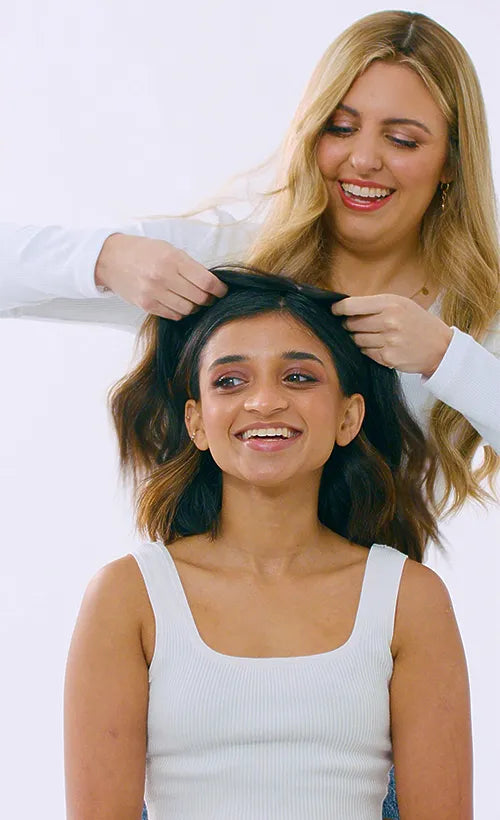You’ve just brought a tiny human into the world (go you!), you’re navigating night feeds, overflowing laundry baskets, and a body that doesn’t quite feel like your own. And then, just when you think you’re getting the hang of things, you notice clumps of hair clogging up the shower drain. Cue the panic.

First things first: breathe. Hair loss after pregnancy is super common, but that doesn’t mean it’s not confronting. At Lusta, we’re all about real talk and real solutions, so let’s dive into what’s normal, what’s not, and what you can actually do about it.
What Causes Hair Loss After Pregnancy?
During pregnancy, your hormone levels surge—specifically estrogen, which keeps your hair in its growing phase (hello, thick glossy locks!). But once your baby arrives, those hormone levels take a nosedive. Estrogen plummets, and all the hair that was chilling in its growth phase suddenly hits the shedding phase.
This postpartum shedding is called telogen effluvium, and it usually kicks in around 2 to 4 months after giving birth.

How Much Hair Loss Is "Normal"?
On average, we lose about 50 to 100 hairs a day. Postpartum, that number can jump to 300 hairs or more per day. It might sound like a lot (and look even worse when you're cleaning your hairbrush), but it’s often just your body playing catch-up.
Here’s what’s considered normal:
-
Shedding starts 2–4 months postpartum
-
Noticeable thinning, especially around the temples and hairline
-
Hair loss tapers off around the 6- to 12-month mark
If your hair loss continues beyond a year or feels excessively severe, it could be time to speak to a healthcare provider.
Signs Your Hair Loss Might Not Be Normal
Sometimes, it’s more than just hormones doing their thing. Keep an eye out for:
-
Excessive thinning that doesn’t slow down after a year
-
Bald patches or uneven shedding
-
Scalp irritation or inflammation
-
Other symptoms like fatigue, brittle nails, or weight changes (which could indicate a thyroid issue)
Conditions like thyroid dysfunction, iron deficiency, or even androgenic alopecia can be triggered or worsened by childbirth. If you're unsure, get it checked. There's no shame in asking for help.
Okay, But What Can I Do About It?
This may not be what you want to hear, but you can’t stop postpartum hair loss completely. However, there are ways to support your scalp and make your hair feel more like you again:
1. Nourish From the Inside Out
Make sure you're getting enough protein, iron, zinc, and vitamin D. Consider a postnatal supplement (always check with your doctor first).
2. Be Gentle
Now’s not the time for tight ponytails or harsh heat styling. Swap your regular hairbrush for a wide-tooth comb and avoid overwashing.
3. Scalp TLC
Products with ingredients like rosemary oil, caffeine, or niacinamide can help stimulate the scalp. Check out our blog on scalp care tips here.
4. Style Smarter
A Lusta Hair Topper can help you feel more like yourself while your natural hair does its thing. They're breathable, lightweight, and made with real human hair that blends seamlessly.
Explore our Topper Collection to find your perfect match.
Another great option for instant coverage (and instant confidence!) is hair fibers. Think of hair fibers as 'spray on hair'. Our Clingy Fibers are cotton-based and gently attach to your hair strands to give the illusion of thick, full hair.

5. Talk About It
Join our Lusta Community to connect with others who get it. Hair loss can feel isolating, but you're far from alone.
Real Talk: You’re Not Less Than Because of Hair Loss
We know postpartum hair loss can shake your confidence. But here’s the thing: your worth isn’t measured by your ponytail thickness. You've created life. You're showing up every day, messy bun and all.
At Lusta, we believe hair should be fun, not stressful. Whether you choose to rock your natural regrowth, wear a topper, or just vent to someone who gets it—you’re doing amazing.

When to Seek Professional Help
If your hair loss feels like more than postpartum shedding, consider reaching out to a:
-
Dermatologist (for scalp and hair health)
-
Trichologist (a specialist in hair loss)
-
GP or endocrinologist (especially for hormonal or thyroid-related issues)
Final Thoughts: Give Yourself Grace
Hair loss after pregnancy is real, common, and usually temporary. It’s your body recalibrating after a massive shift. Be patient, be kind to yourself, and don’t be afraid to ask for support (or invest in a little confidence boost).
Whether it’s through nourishing routines, supportive communities, or a gorgeous new hair topper, you’ve got options.
And remember: at Lusta, we’ve got you covered.




0 comments